Unit 3 Grammar
高中英语-unit 3 Grammar零

2.作宾语
V-ing 形式既可作_动__词_的宾语, 也可作_介_词__的宾语。 ★ We would appreciate hearing from you.
我们会感激你的来信。 ★ The bird escaped _b_e_i_n_g_c_a_u_g__h_t __ (catch) .
★ I feel like _jo__in_i_n_g____ (join) the army.
【比较】
作定语,表将来, 表被动的动作。
The building to be built next year is our
school.
The building built last year is our school.
作定语,表过去、被动、 完成的动作。
• The building having been built last year is our school.
1. Ali said that she wouldn’t mind _________ alone at home.
A. left B. being left C. to be left D. leaving
2. She __________ the key. A. admitted taking B. admitted taking C. admitted having taken D. admitted to have taken
●用动名词的主动形式表被动意义的词有 _w__a_n_t_,_n_e_e_d__, _r_e_q_u_i_r_e_,_d_e_s_e_r_v_e_,_b_e__w__o_r_th__等___。
●在allow,forbid,permit等动词后直接跟动名词 形式作宾语,若后面有名词或代词作宾语,其后 用动词不定式作宾补。 allow\ forbid\ permit\advise\forbid doing sth; allow\ forbid\ permit\advise\forbid sb to do sth;
Unit 3 Grammar 讲义-高一英语牛津译林版(2020)必修第一册
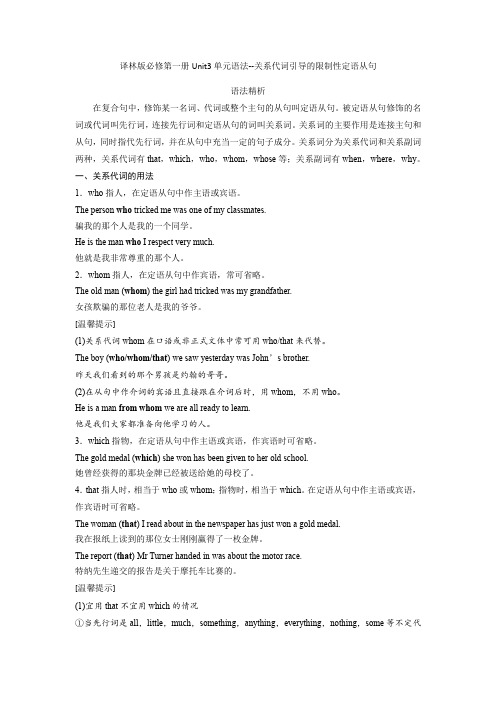
译林版必修第一册Unit3单元语法--关系代词引导的限制性定语从句语法精析在复合句中,修饰某一名词、代词或整个主句的从句叫定语从句。
被定语从句修饰的名词或代词叫先行词,连接先行词和定语从句的词叫关系词。
关系词的主要作用是连接主句和从句,同时指代先行词,并在从句中充当一定的句子成分。
关系词分为关系代词和关系副词两种,关系代词有that,which,who,whom,whose等;关系副词有when,where,why。
一、关系代词的用法1.who指人,在定语从句中作主语或宾语。
The person who tricked me was one of my classmates.骗我的那个人是我的一个同学。
He is the man who I respect very much.他就是我非常尊重的那个人。
2.whom指人,在定语从句中作宾语,常可省略。
The old man (whom) the girl had tricked was my grandfather.女孩欺骗的那位老人是我的爷爷。
[温馨提示](1)关系代词whom在口语或非正式文体中常可用who/that来代替。
The boy (who/whom/that) we saw yesterday was John’s brother.昨天我们看到的那个男孩是约翰的哥哥。
(2)在从句中作介词的宾语且直接跟在介词后时,用whom,不用who。
He is a man from whom we are all ready to learn.他是我们大家都准备向他学习的人。
3.which指物,在定语从句中作主语或宾语,作宾语时可省略。
The gold medal (which) she won has been given to her old school.她曾经获得的那块金牌已经被送给她的母校了。
4.that指人时,相当于who或whom;指物时,相当于which。
人教课标版必修一英语Unit3 Grammar 课程教学设计(一)
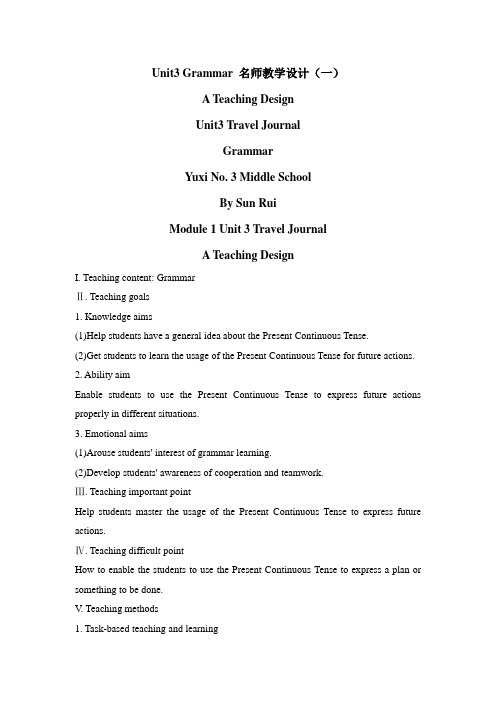
Unit3 Grammar 名师教学设计(一)A Teaching DesignUnit3 Travel JournalGrammarYuxi No. 3 Middle SchoolBy Sun RuiModule 1 Unit 3 Travel JournalA Teaching DesignI. Teaching content: GrammarⅡ. Teaching goals1. Knowledge aims(1)Help students have a general idea about the Present Continuous Tense.(2)Get students to learn the usage of the Present Continuous Tense for future actions.2. Ability aimEnable students to use the Present Continuous Tense to express future actions properly in different situations.3. Emotional aims(1)Arouse students' interest of grammar learning.(2)Develop students' awareness of cooperation and teamwork.Ⅲ. Teaching important pointHelp students master the usage of the Present Continuous Tense to express future actions.Ⅳ. Teaching difficult pointHow to enable the students to use the Present Continuous Tense to express a plan or something to be done.V. Teaching methods1. Task-based teaching and learning2. Cooperative learning3. DiscussionVI. Teaching aids:1. The multi-media2. The blackboardVII. Teaching ProceduresStep 1 GreetingGreet the students as usual.Step 2Lead-in1. Show the pictures of some activities on the screen and ask the students to answer the question “What is she/he doing?”【设计意图】通过观看与各种活动有关的图片,说出图片中的人物正在做什么,调动学生的热情,激起学生的学习兴趣,为本节课创设良好的开端。
unit 3 grammar

用作状语 1. Being asked to answer the question, she couldn’t refuse. 2. Having been given such a good chance, how would you not value it at all?
7. 作结果状语 He turned off the lights , seeing nothing .
the Passive Voice of
—ing Form
(not) being done (not) having been done
用作主语 1. Being killed by sharks in the sea is a common thing. 2. Being helped out by the killer whales, the whalers were able to make successful kill.
______ to sunlight for too much time will do harm to one’s skin. (上海高考题 2002) A. Exposed B. Having exposed C Being exposed C. D. After being exposed
用作宾语 V-ing 形式既可作动词的宾语, 也 可作介词的宾语。 1.He was afraid of being scolded by the teacher. 2. I remember having been told the story. 3. I didn’t like the idea of being thrown about in a boat on a rough sea.
unit3-grammar-宾语从句与表语从句
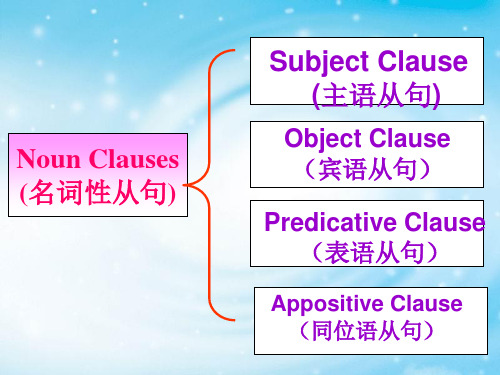
无义 1. The mother’s question was that she has no time to look after her daughter.
是否 2.The question is whether that boy will
turn up in time.
….的样子 3. Tom is no longer what he used to be .
4. I don’t know _w__h_e_t_h__eror not he is well.
5. I don’t know _w_h__e_th__erto go.
• 由疑问词引导的宾语从句 用who, whom, what,
when, where, how, whenever等关联词引导 时,连接词在从句中担当 一定成分,具有一定的意 义,从句语序要用陈述语 序。
if / whether
1. I asked her i_f_/_w__h_e_t_h_e_rshe had a bike.
2. We’re worried about _w__h_e_t_h_e_ rhe is safe.
3. I wonder __w__h_e_t_h_e_r_/_ifhe is well.
注意2:whether / if
A. 引导宾语从句时可互换. B. 位于介词后要用whether. C. 位于句首时要用whether. D. 引导表语从句, 主语从句, 同位语
1. He asked (谁能回答这个问题) _w__h_o_c_o_u_l_d__a_n_sw__e_r_t_h_e_q_u__es_t_io_n___.
2. Do you know__w_h_o_m__t_h_ey__a_re__w_a_it_in_g__for (他们在等谁)
人教版高中英语必修3同步讲练:Unit 3 Grammar (含答案)
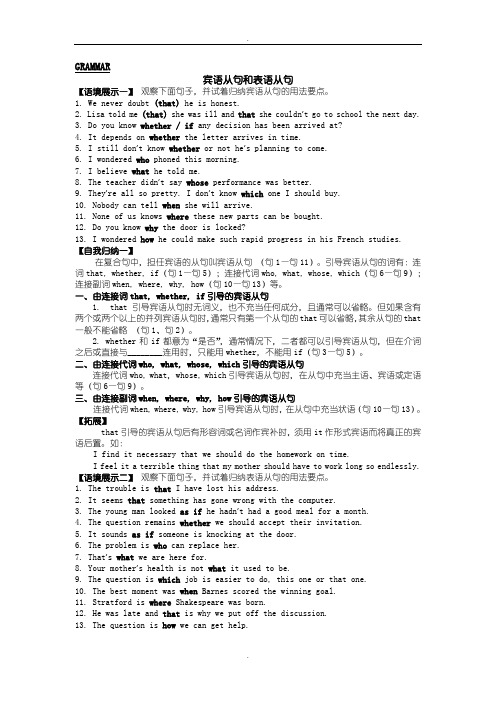
GRAMMAR宾语从句和表语从句【语境展示一】观察下面句子,并试着归纳宾语从句的用法要点。
1. We never doubt (that) he is honest.2. Lisa told me (that) she was ill and that she couldn’t go to school the next day.3. Do you know whether / if any decision has been arrived at?4. It depends on whether the letter arrives in time.5. I still don’t know whether or not he’s planning to come.6. I wondered who phoned this morning.7. I believe what he told me.8. The teacher didn’t say whose performance was better.9. They’re all so pretty. I don’t know which one I should buy.10. Nobody can tell when she will arrive.11. None of us knows where these new parts can be bought.12. Do you know why the door is locked?13. I wondered how he could make such rapid progress in his French studies.【自我归纳一】在复合句中,担任宾语的从句叫宾语从句(句1—句11)。
引导宾语从句的词有:连词that, whether, if(句1—句5);连接代词who, what, whose, which(句6—句9);连接副词when, where, why, how(句10—句13)等。
Unit3语法课件2024-2025学年沪教牛津版七年级英语上册

1. 找出这里含有形容词的句子
Recently Beijing Universal Studios theme park has opened. The park is the fifth universal cinema in the world and is so beautiful! Today, I got up early to rush to the park. The theme park looks fantastic! When I stepped into the Wizarding World of Harry Potter, I got crazy because Harry Potter is my idol! Then I spent a day in this park. I remained excited when I was leaving. How I wish I could stay here forever even if it seems impossible! But I think I will come back again!
Oct. 1st
1. 形容词副词概念 2. 形容词副词用法
1. The park is beautiful. 是漂亮的 2. The theme park looks fantastic!看起来超棒 3. I got crazy because Harry Potter is my idol! 变得疯狂 4. I remained excited when I was leaving. 保持兴奋 5. How I wish I could stay here forever even if it seems impossible!
牛津译林英语九年级上册Unit3Grammar(共40张PPT)

3. Which method should I use to solve the
problem? n. 方法
v. 解决,解答
I am not sure _w_h_i_c_h_m__e_t_h_o_d_I__sh_o_u__ld__u_s_e
_t_o_s_o_l_v_e_t_h_e_p_r_o_b_l_e_m_.
Kitty
n. 安静,沉默
I need silence when I’m studying. I don’t know w__h_e_r_e I can find a quiet place.
Peter
I need someone to share my worries with. I wonder _w_h_o_/_w__h_o_m_ I should go to for help. n. 担心,令人担忧的事
时态 主句为一般现在时, 从句依据实际情况而定
主句为一般过去时, 从句用相应的过去式
客观真理,自然现象等不变 语序 陈述语序
More problems and questions A1.The Class 1, Grade 9 students are talking about their problems. Help them complete each object clause below with a correct question word.
1. I wonder what I should do.
2. Sometimes we forget when we should
stop.
3. I do not understand why they are so
strict with me.
Unit 3单元重点语法Grammar非谓语动词之动词ing形式做主语-学年高二英语选择性必修第一册

Unit 3单元重点语法非谓语动词之动词ing 形式做主语一、单项选择When you're learning to drive,a good teacher makes a big difference.A. haveB. havingC. and haveD. and having1. 一Henry doesn't seem like the same person.—so much in the war has made him more thoughtful.A.For himto seeB. His seeingC. Having seenD.To be seeingWhen you're ill,to get well again is often half the battle.A.wantingB. wantC. to be wantingD.having wantedthis report in such a short time was quite a difficult exercise.A. Getting, doneB. Get, doneC. To get, to doD. Getting, to do5. . 一What's it that cost him the job?-experience. He was always very nervous.ckedB.Being lackedckingcking ofIt is no use without taking action.A plainingB plainC.to complainD plainedto as much as English as possible is a good way to learn English well.A.ExposedB.Being exposedC.Having exposedD.To exposebasic first-aid techniques will help youreact quickly toemergencies.A.To knowB. knownC. KnowingD.Having knownHis habit,to the news on the radio remains unchanged.A.listensB. listeningC. listenedD.to listenmy weak spots can make me become a better person.A. Having been knownC ・ Known6. made the teacher very angry. A. He came to school late againC. His came toschool late again 7. the ticket to the concert really made me very sad.填 Landing o Responding【解析】考查动名词。
牛津译林版英语九年级上册Unit3 grammar课件

时态
Exploration: 特殊疑问句做宾语
• Object clauses introduced by question words
• Wh-引导词 +主+谓+其他
e.g. I wonder what I should do. Daniel does not know whom he should talk to.
He asked if they liked to make friends with them.
Can you give me some advice?
Why not do …?
Why don’t you do …? What/how about doing …? Perhaps you should do … Let’s do … Shall we do …?
swimming this afternoon?
√ A. go B. to go C. going D. goes
1. Why do I always feel tired in class? 2. How much sleep do we need every day? 3. Which method should I use to solve the problem? 4. Where can we buy a good dictionary? 5. How can I improve my English quickly? 6. Whom should we ask for help? 7. What would life be like without hobbies?
Rewrite the sentences
1. I’d like to know … Where is your school? I’d like to know where your school is.
Unit 3 第3课时 Grammar语法 反意疑问句高一英语必修一(人教版2019)
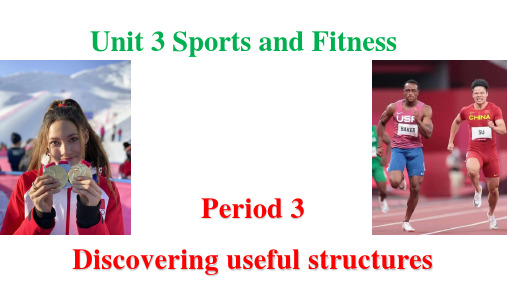
3.陈述句的主语是nobody, no one, everyone, somebody等不定代词时,反意疑问部分的主语多用 he/they。 例:Everyone knows him, don’t they/ doesn’t he? 陈述句的主语something,nothing,anything,everything 等不定代词时,反意疑问部分的主语多用it。 例:Nothing in the world is difficult, is it?
?
4. Everyone should be on time, shouldn’t they ?
5. What he said isn’t true,
is it ?
6. She dislikes sports, doesn’t she ?
7. There was a mountain, wasn’t there ?
— They don’t work hard, do they? — Yes, they do./ No, they don’t.
不,他们工作努力。/ 是的,他们工作不 努力。
2.当陈述句部分是否定结构,反意疑问句用肯定式提问时 ,回答yes或no与汉语的意思正好相反。这种回答时,yes 要翻译为“不”,no翻译为“是” 例:---Lucy didn't attend the meeting, did she? 露西没有参加会议,是吗?
Unit 3 Sports and Fitness
Period 3 Discovering useful structures
All sports for all people. —Pierre de Coubertin
UNIT3第3课时GRAMMAR(知识精讲分层练习)(教师版)九年级下学期英语讲义(牛津译林版)

Unit 3 Robots 课时 3 Grammar影目标导航重点词组」I. own a robot 2.consider the robot a great help in my daily life 3.go on a business trip4. have a serious heart problem5.have to take medicine every day6.have a poor memory7.remind you to take pills at the right time8.feel lonely9.lock the door lO.Go up and down thestairs o 11 ,have a better sleep 重点句型1. He saw that the robot was making breakfast. He saw the robot making breakfast.2. He (bund that his flat was in a complete mess.He found his flat in a complete mess.3. The robot no longer knew when it should cook breakfast.The robot no longer knew when to cook breakfast.4. Mr Jiang did not know what he should do with the robot.Mr Jiang did not know what to do with the robot.5. Mr Jiang is always so busy that he does not have any time for hobbies. Mr john is always too busy to have any time tbr hobbies.6. The robot is so smart that it can do a lot of things. The robot is smart enough to do a lot of things.7. Mr Jiang plans to buy a robot so that he can have more free time.Mr Jiang plans to buy a robot in order to have more free (ime<>♦知识点睛©consider ...as 把…看做 常用被动结构be considered as...? “被认为/看做”?Purple is considered as the noblest color.紫色被认为是最高贵的颜色。
Unit 3 Grammar重点语法as----as----和反身代词的用法(牛津译林版)
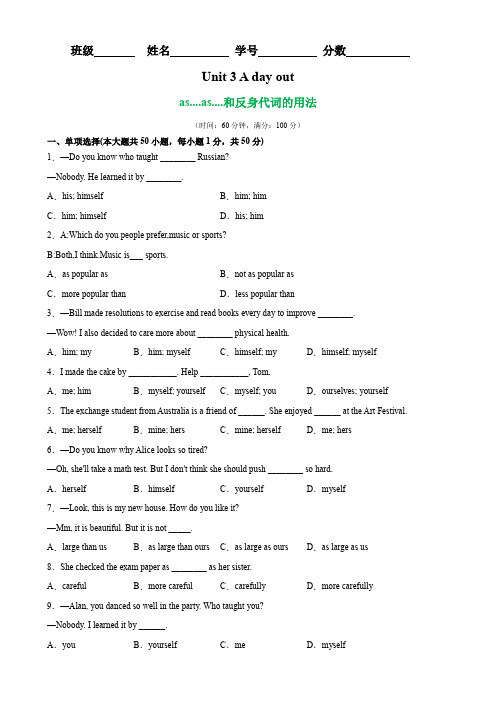
班级姓名学号分数Unit 3 A day outas....as....和反身代词的用法(时间:60分钟,满分:100分)一、单项选择(本大题共50小题,每小题1分,共50分)1.—Do you know who taught ________ Russian?—Nobody. He learned it by ________.A.his; himself B.him; himC.him; himself D.his; him2.A:Which do you people prefer,music or sports?B:Both,I think.Music is___ sports.A.as popular as B.not as popular asC.more popular than D.less popular than3.—Bill made resolutions to exercise and read books every day to improve ________.—Wow! I also decided to care more about ________ physical health.A.him; my B.him; myself C.himself; my D.himself; myself4.I made the cake by ___________. Help ___________, Tom.A.me; him B.myself; yourself C.myself; you D.ourselves; yourself 5.The exchange student from Australia is a friend of ______. She enjoyed ______ at the Art Festival. A.me; herself B.mine; hers C.mine; herself D.me; hers6.—Do you know why Alice looks so tired?—Oh, she'll take a math test. But I don't think she should push ________ so hard.A.herself B.himself C.yourself D.myself7.—Look, this is my new house. How do you like it?—Mm, it is beautiful. But it is not _____.A.large than us B.as large than ours C.as large as ours D.as large as us8.She checked the exam paper as ________ as her sister.A.careful B.more careful C.carefully D.more carefully 9.—Alan, you danced so well in the party. Who taught you?—Nobody. I learned it by ______.A.you B.yourself C.me D.myself10.—We shouldn't worry about Mary.—You are right. She is ________ to look after ________.A.old enough; herself B.big enough; herself C.enough old; her D.enough big; her 11.—Who taught ________ English last year, Michael?—I learned it by ________.A.you; myself B.your; myself C.yourself; me D.yourself; myself 12.If I am not sure what's wrong with Tom, it's better for me to ask him ________. A.yourself B.itself C.myself D.herself 13.Those clever children learned it all by___________. Nobody told them___________. A.them; where to sell it B.themselves; how to do itC.them; when to get it D.themselves; what to make it 14.When you both get into trouble, don’t give up but cheer _________up.A.ourselves B.himself C.yourselves D.myself 15.— He, together with his parents ______going to visit Shanghai in July. How about you?— I'm afraid I have to stay at home _ _.A.are; on my own B.is, by myself C.is; by my own D.are; on myself 16.—Mom! Could you please teach ________ English?—Sure! But it is more important to learn it by________.A.my, yourself B.me, you C.my, you D.me, yourself 17.Mr. Black is a disabled man, so he can’t look after________well.A.myself B.yourself C.himself D.herself 18.—I'll have a tennis game tomorrow. I'm a little bit nervous.—Believe in ________. You're the best in our club.A.yourself B.myself C.herself D.himself 19.Sandy’s handwriting is ________, if not better than, Mike.A.as good as B.as well as C.not as good as D.not as well as 20.Don’t just wait for help. God helps those who help ________.A.him B.them C.yourselves D.themselves 21.The little girl could look after _______ though she was only five years old.A.she B.her C.hers D.herself 22.—Did they have a good time at the party?—Yes. They enjoyed ________.A.themselves B.myself C.yourselves D.herself 23.—Who teaches ________ French?—Nobody, I learn it by ________.A.your; mine B.you; myself C.your; myself D.you; me24.— Who bought the birthday cake for you?—Oh! My daughter made it by _________.A.myself B.yourself C.herself D.himself25.Boys and girls, you have to plant all the trees ________ tomorrow.A.myself B.herself C.themselves D.yourselves 26.Nanjing isn’t as large _____ Shanghai, but it’s the second _____ city in East China. A.like, largest B.as, largestC.like, large D.as, large27.—Anna is as ________ as Sally.—Yes, but she is ________ than Sally.A.tall; outgoing B.taller; outgoing C.tall; more outgoing D.taller; more outgoing 28.I think the story is not so ______ as that one.A.interesting B.interestedC.more interesting D.most interesting29.—Where did you buy the delicious cakes?—Oh, my mother made them by ________.A.himself B.itself C.herself D.myself 30.—Who taught_________ English last term?—Nobody. He learned it by _________. A.his; him B.him; his C.him; himself D.his; himself 31.—Who teaches ______ English, Lily? —No one. I learn it ______.A.your; me B.you; myselfC.yourself; my D.your; myself32.Jim is not as _________ as his sister. But he works very hard.A.clever B.cleverer C.cleverest D.the cleverest 33.—What’s the matter, Ben? Did you hurt ________ playing basketball?—Yes, I did. I should go home and get some rest.A.myself B.himself C.yourself D.yourselves 34.The roads in the town are as _______ as the ones in the city. Four cars can crossat the same time.A.wide B.widely C.clear D.clearly35.—Mum, could you buy me a dress like this?—Certainly, we can buy _______ one than this, but _______ this.A.a better; better than B.a worse; as good asC.a cheaper; as good as D.a cheaper; as cheap as36.—Dad, could you buy me a computer like this?—Of course, we can buy ________ one than this, but ________ it.A.a better; better than B.a popular; as good asC.a more popular; not as good as D.a cheaper; as good as37.You don't need to be anybody else. You just need to be ________.A.you B.yourself C.mine D.myself38.—Can Linda solve the problem by ________?—Sure, she can do it.A.herself B.yourself C.ourselves D.himself39.Lily isn’t as ________ as Peter. She often makes mistakes in her composition.A.careless B.careful C.careless D.carefully40.I'm truly sad to see Bob is ________ hard-working ________ he was two years ago. I remember he studied hard and did well at school at that time.A.more; than B.not as; as C.as; as41.— Kitty, tell Amy to enjoy _________ in Shanghai. I’ll join you a week later.— OK, Dad.A.herself B.yourself C.yourselves D.myself42.—She is too busy to help us with the work.—Let’s do it ________.A.herself B.myself C.yourselves D.ourselves43.My grandma always tells us that believing in ________ is very important.A.he B.himself C.we D.ourselves44.The children had a picnic yesterday. They enjoyed ________.A.theyself B.themselves C.theyselves D.themself45.Julie is my good friend. She is as ______ as me.A.friend B.friendly C.friendlier D.friendliest46.Li Lei is as ________ as his father.A.funny and outgoing B.more funnier and outgoing C.funnier and more outgoing D.more funny and outgoing 47.—Dad, could you buy me a mobile phone like this?—Of course. We can buy a ________ one than this, but ________ it.A.cheaper; as good as B.more popular; not as good as C.more popular; not so good as D.more expensive; worse than 48.—Tom, I’m going to work. Please look after ________well.—Don’t worry, Mom. I will.A.herself B.myself C.yourself D.himself 49.She is as ________as Lilei.A.friendly B.more friendly C.friendlier D.friendliest 50.— Sophia can speak Chinese very well. Who told her?—No one. She taught ________.A.herself B.himself C.her二、用所给单词的正确形式填空(本大题共25小题,每小题2分,共50分) 51.We enjoyed __________ (we) on the beach last summer holiday.52.As a student, I should try to finish my homework by ________ (I).53.If we can take better care of ________ (us), our parents will be less worried about us. 54.—What's the matter with her?—She cut ____ (she) when cooking dinner.55.Jim didn’t think about ________ (he). He wanted to save the boy.56.My pet cat can find some food for ________ (it).57.This book is as ________________(interesting) as that one.58.Be careful,or you will cut________(you).59.The pretty girl looked at ________ in the mirror. (she)60.I’d like to show you some photos of _________ during my visit to the U.K.(I)61.I think life ________ (it) is a learning process.62.My parents bought me some gifts but nothing for ________ (they) during the vacation. 63.Kids shouldn't depend on parents too much. They should depend on ________ (they). 64.He must learn to look after ____ (he) when his parents aren’t at home.65.The children are too young to look after _________(they)66.The little girl usually finishes her homework by ________ (her) and doesn’t need others’ help. 67.This book is as ________ (interest) as that one.68.I am as ________ (tall) as my sister.69.My feet are as _______ (cold) as ice.70.The people here were not so ________ (friend) as you.71.He must learn to look after ________ (he) when his parents aren't at home.72.I bought something special for my parents, but nothing for _________(I).73.Lucy is not as ________(tall)as Cathy.74.The boy’s parents were dead because of COVID-19. Now he must look after ________ (him). 75.Let’s stop to have a rest. We’d better not make ________ (we) too tired.参考答案:1.C【解析】句意:-你知道谁教他法语的吗?-没有人。
必修三 unit3 宾语从句 Grammar
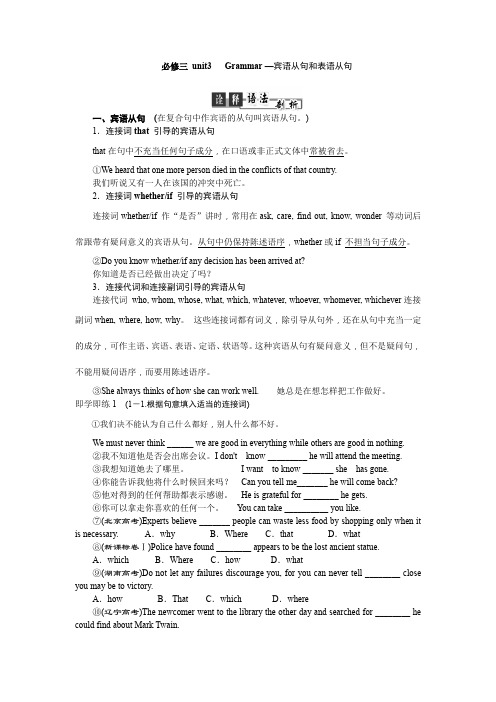
必修三unit3 Grammar —宾语从句和表语从句一、宾语从句(在复合句中作宾语的从句叫宾语从句。
)1.连接词that 引导的宾语从句that在句中不充当任何句子成分,在口语或非正式文体中常被省去。
①We heard that one more person died in the conflicts of that country.我们听说又有一人在该国的冲突中死亡。
2.连接词whether/if 引导的宾语从句连接词whether/if 作“是否”讲时,常用在ask, care, find out, know, wonder 等动词后常跟带有疑问意义的宾语从句。
从句中仍保持陈述语序,whether或if 不担当句子成分。
②Do you know whether/if any decision has been arrived at?你知道是否已经做出决定了吗?3.连接代词和连接副词引导的宾语从句连接代词who, whom, whose, what, which, whatever, whoever, whomever, whichever连接副词when, where, how, why。
这些连接词都有词义,除引导从句外,还在从句中充当一定的成分,可作主语、宾语、表语、定语、状语等。
这种宾语从句有疑问意义,但不是疑问句,不能用疑问语序,而要用陈述语序。
③She always thinks of how she can work well. 她总是在想怎样把工作做好。
即学即练1 (1-1.根据句意填入适当的连接词)①我们决不能认为自己什么都好,别人什么都不好。
We must never think ______ we are good in everything while others are good in nothing.②我不知道他是否会出席会议。
I don't know _________ he will attend the meeting.③我想知道她去了哪里。
Unit 3 Grammar 知识点整理 牛津译林版英语九年级上册讲义 (含答案)
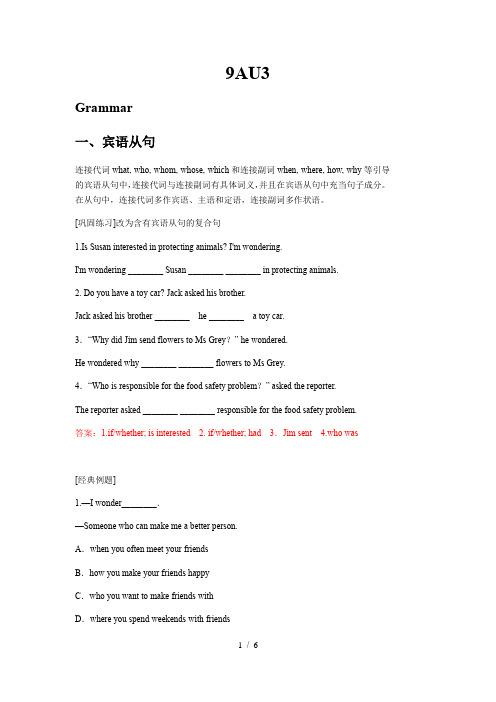
9AU3Grammar一、宾语从句连接代词what, who, whom, whose, which和连接副词when, where, how, why等引导的宾语从句中,连接代词与连接副词有具体词义,并且在宾语从句中充当句子成分。
在从句中,连接代词多作宾语、主语和定语,连接副词多作状语。
[巩固练习]改为含有宾语从句的复合句1.Is Susan interested in protecting animals? I'm wondering.I'm wondering ________ Susan ________ ________ in protecting animals.2. Do you have a toy car? Jack asked his brother.Jack asked his brother ________ he ________ a toy car.3.“Why did Jim send flowers to Ms Grey?” he wondered.He wondered why ________ ________ flowers to Ms Grey.4.“Who is responsible for the food safety problem?” asked the reporter.The reporter asked ________ ________ responsible for the food safety problem.答案:1.if/whether; is interested 2. if/whether; had3.Jim sent 4.who was[经典例题]1.—I wonder________.—Someone who can make me a better person.A.when you often meet your friendsB.how you make your friends happyC.who you want to make friends withD.where you spend weekends with friends2.I never doubt ________________________.A. that Gulliver in Lilliput is worth readingB. whether Gulliver in Lilliput is worth readingC. if Gulliver in Lilliput is worth reading itD. that Gulliver in Lilliput is worth being reading3.Tom asks _______ after he finishes his project.A. whether can he go to the cinemaB.whether he can go to the cinemaC. that he can go to the cinemaD.that can he go to the cinema4.—Have you ever seen the film The taking of Tiger Mountain?—Yes. And I believe ________ it was the best film in 2014.A.thatB. whatC. howD. if5.—Excuse me, I wonder _______ the plane can land on time.—Wait a minute, please. Let me check it out.A.ifB. whichC. thatD. who答案:CABAA6.This morning my mother asked me ________.A.why he is not hereB. where Julia went last weekendC.what time it isD. how did my brother do it7.-What did Max just say to you?-He asked me_____________.A.If I would like to go skatingB.when did I buy this CDC.where I will spend the weekendD.that I had a good time8.--Bob,please tell me ___________. --In south Hill School.A.where will the match be heldB.where the match will be heldC.when will the match be heldD.when the match will be held9.I know he's been curious about everything, but that's__________. Be patient!A. what do kids likeB. what kids likeC. what are kids likeD. what kids are like10.-Peter, is there anything else you want to know about colours?- Yes, I am still wondering_______ .A.why do strong colours make people take action easilyB.that there is a relationship between colours and moods’C.whether colours can change our moods and improve our lifeD.what do different colours represent and how do they influence us答案:BABDC11.—Can you tell me________yesterday?—It was given by Mrs King.A. whom the speech was givenB. whom gave the speechC. who gave the speechD. who the speech gave by12.—We are in trouble now. I have no idea .—Neither do I. We have to ask for help.A. how can the problem be solvedB. how the problem can be solvedD. how the problem can solve13.—Could you please tell me________?—Sorry,I’m new here.A.where the airport wasB.where was the airportC.where the airport isD.where is the airport14.They have no idea at all_________or not.A. if has he gone to BeijingB.whether has he gone to BeijingC.if he has gone to BeijingD.whether he has gone to Beijing15.Could you tell me ________ a meeting in Guangzhou next week?A. if there was going to beB. if there is going to beC. whether is there going to beD. whether there is going to have 答案:CBCDB二、表示建议的句型1.Shall I(we) do...?2.Let’s do...3.How/What about doing...?4.Why not/Why don’t you do...?[经典例题]1.—Do you really think wearing yellow can bring good luck?—Well, I am not sure. But________ have a try?A. why don’tB. why not youC. what aboutD. why not2.—Could you tell me some information about the hotels in your country?—Why not________on the Internet?A.look for itB.to look for itC.to look it upD.look it up3._______ give up smoking.A. Shall weB. Why don’t youC. What aboutD. Perhaps you should4.It’s too hot. How about______ swimming this afternoon?A. goB. to goC. goingD. goes5.—Mum, I've caught a bad cold. I'm not feeling well.—________ take this medicine, dear? It will make you feel better.A.Shall we B.Why notC.Let's D.Why don't答案:DDDCB【知识梳理1】I need silence when I'm studying. (P40)当我学习时我需要安静。
Unit3Grammar学案牛津译林版英语九年级下册
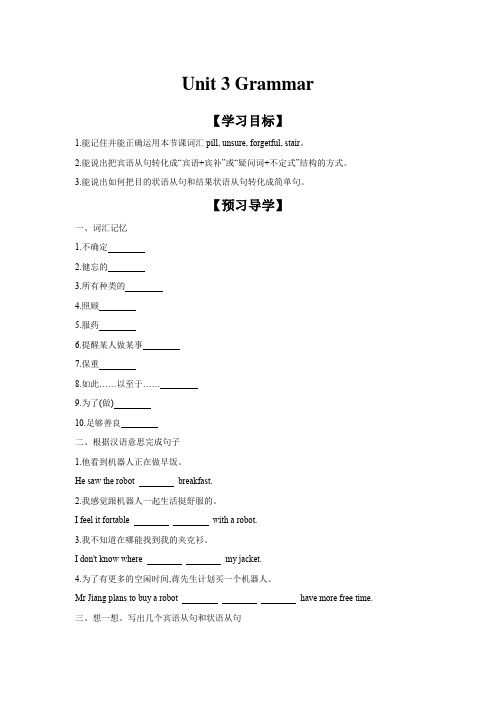
Unit 3 Grammar【学习目标】1.能记住并能正确运用本节课词汇pill, unsure, forgetful, stair。
2.能说出把宾语从句转化成“宾语+宾补”或“疑问词+不定式”结构的方式。
3.能说出如何把目的状语从句和结果状语从句转化成简单句。
【预习导学】一、词汇记忆1.不确定2.健忘的3.所有种类的4.照顾5.服药6.提醒某人做某事7.保重8.如此……以至于……9.为了(做)10.足够善良二、根据汉语意思完成句子1.他看到机器人正在做早饭。
He saw the robot breakfast.2.我感觉跟机器人一起生活挺舒服的。
I feel it fortable with a robot.3.我不知道在哪能找到我的夹克衫。
I don't know where my jacket.4.为了有更多的空闲时间,蒋先生计划买一个机器人。
Mr Jiang plans to buy a robot have more free time.三、想一想。
写出几个宾语从句和状语从句1.I find that______________________________________________________________2.I consider that______________________________________________________________3.Mr Jiang doesn't know______________________________________________________________4.The boy is so talented that______________________________________________________________【答案】一、词汇记忆1.unsure2.forgetful3.all kinds of4.look after5.take medicine6.remind sb. to do sth.7.take care8.so...that...9.in order to10.kind enough二、根据汉语意思完成句子1.making2.to live3.to find4.in order to三、想一想。
Unit2Unit3Grammar宾语从句语法复习牛津译林版九年级英语上册

牛津译林版9A Unit 2-Unit 3 Grammar 宾语从句语法复习(一)由that,if或whether引导的宾语从句在复合句中,充当宾语的从句叫宾语从句。
一、由that引导的宾语从句1.that可以引导宾语从句,此时从句部分相当于一个陈述句。
that无词义,在从句中不充当成分,在口语或非正式文体中常省略。
宾语从句可跟在主句动词(know,think,believe,hope,mean,wish,say等)或主句形容词(afraid,certain,sure,glad,sorry 等)之后。
▶I believe (that) you are a person of god character.我认为你是一个具有优秀品质的人。
▶I hope (that) she will become a wonderful woman just like her mother.我希望她将成为一个像她母亲一样了不起的女性。
▶I am afraid (that) I will lose this important match.恐怕我会输掉这场重要的比赛。
▶I am glad (that) you can come for dinner.我很开心你能来吃晚餐。
【特别提醒】在以下情况下,that不可省略。
(1)当宾语从句的主语是that 时。
▶He says that that is a real golden necklace.他说那是一条真的黄金项链。
(2)当宾语从句前有插入语时。
▶He says, for example, that he is interested in Maths.他说,例如他对数学感兴趣。
2.由that 引导的宾语从句的否定形式当主句的主语是第一人称(I,we),而且谓语动词是think,guess,believe,suppose,expect等时,如果从句要表达否定含义,则否定只能体现在主句的谓语动词上面,这种情况叫作否定前移。
- 1、下载文档前请自行甄别文档内容的完整性,平台不提供额外的编辑、内容补充、找答案等附加服务。
- 2、"仅部分预览"的文档,不可在线预览部分如存在完整性等问题,可反馈申请退款(可完整预览的文档不适用该条件!)。
- 3、如文档侵犯您的权益,请联系客服反馈,我们会尽快为您处理(人工客服工作时间:9:00-18:30)。
-est most
the
the superlative of adjectives
最高级形式
例词
大多数单音节
形容词
+ -est
单音
high →highest small →smallest
节形 以-e结尾
+ -st
large →largest wide →widest
容词
一个元音 + 一 双写辅音字
more expensive lighter
heavier smaller
bigger
Grammar B The superlative of adjectives
The red laptop is the smallest among/of the three. When we compare more than two people or things, we use the superlative of adjectives.
个辅音
母,再加-est
big →biggest
hot → ho,再 happy → happiest silly →
双音 节形 容词
或-ly结尾
加-iest
以非重读元音 /l/或/R(r)/结尾
、+
-est(-st)
以-ful, -less, most + 形
silliest clever → cleverest simple → simplest
When we compare two people or things, we can
use the comparative of adjectives.
The first computers were _b__ig_g_e_r___ than cars, but now they are becoming __s_m_a_ll_e_r_ and __b_e_t_te_r___. Computers can calculate at a __f_a_s_te_r___ speed than we can. Computers are not __c_le_v_e_r_e_r_ than human beings, but they may be able to do a _b_e_t_t_e_r___ job than us. In the past, computers were __m__o_r_e_ expensive, but now they are much _c_h_e_a_p_e_r_.
more + 形容词原级
careful → more careful boring → more boring
多 音 节
含三个或三个以 more + 形容 difficult → more difficult
上音节
词原级
popular→ more popular
Complete the conversation below and on page 40 with the comparative of the adjectives from the box.
¥6,000
¥4,600
¥7,500
The red laptop is the smallest among/of the three, but it is __t_h_e__m_o_s_t__e_x_p_e_n_s_iv_e_.
How do we form the superlative of adjectives?
Oxford English
Unit Module 2 Science and technology
3
Computers
Period 3
Grammar
Revision and introduction
Will computers make our lives better?
Grammar A The comparative of adjectives Complete the article.
careful → most careful
-ed, -ing结尾 容词原级
boring → most boring
多 音 含 三 个 或 三 个 most + 形容 difficult → most difficult
节 以上音节
词原级
How do we form the comparative of adjectives?
The first computers were ___b_ig_g_e_r__ than cars, but now they are becoming _s_m__a_ll_e_r_ and __b_e_t_t_e_r__. Computers can calculate at a __f_a_s_te_r___ speed than we can. Computers are not _c_l_e_v_e_r_e_r_ than human beings, but they may be able to do a __b_e_t_te_r___ job than us. In the past, computers were __m_o_r_e__ expensive, but now they are much _c_h_e_a_p_e_r_.
-er more than
the comparative of adjectives
比较级形式 例词
单 大多数单音节形 音 容词
+ -er
high → higher small → smaller
节 形
以-e结尾
+ -r
large → larger
wide → wider
容 一个元音 + 一个 双写辅音字母,big → bigger
词 辅音
再加-er
hot → hotter
双 音
以辅音字母+y或- 去掉y,再
ly结尾
加-ier
happy → happier silly → sillier
节 形
以非重读元音、 /l/或/R(r)/结尾
+ -er(-r)
clever → cleverer simple → simpler
容 词
以 -ful , -less , ed,-ing结尾
